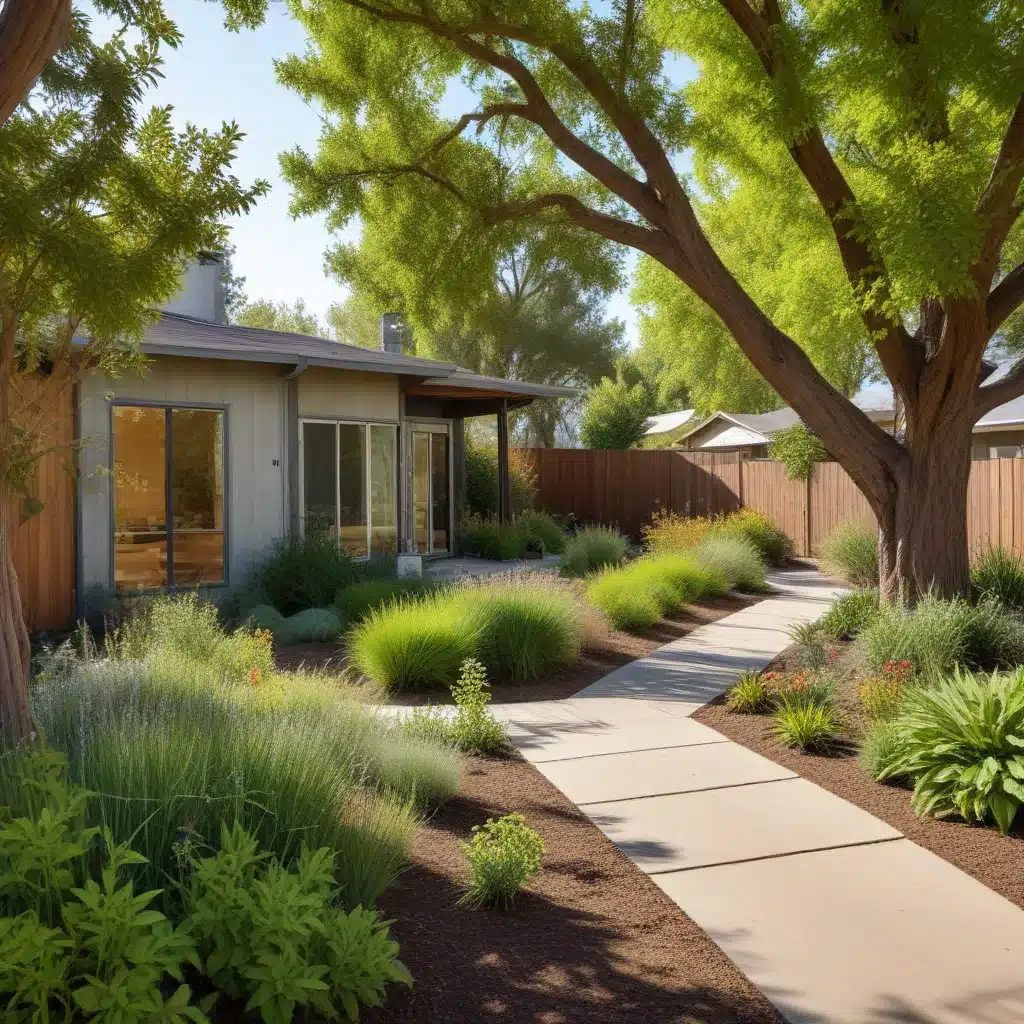
Pioneering Sustainable Suburban Development
Davis, California, nestled in the heart of the Sacramento Valley, has long been heralded as a shining example of sustainable suburban development. Bucking the traditional norms of sprawling, car-dependent neighborhoods, the community of Village Homes has been a trailblazer in demonstrating how residential areas can seamlessly integrate eco-friendly design, renewable energy, and agricultural elements to create a truly sustainable living experience.
Established in the 1970s, Village Homes is a 240-home, 70-acre development that has become a living laboratory for innovative approaches to urban planning and renewable energy. As described in the Steemit article, the neighborhood boasts an abundance of lush greenbelts, orchards, vineyards, and community garden spaces, all of which are carefully integrated into the residential layout. This intentional blending of nature and the built environment is a hallmark of the community’s design, which was spearheaded by visionary urban planner Michael Corbett.
Harnessing the Power of Nature
One of the most remarkable aspects of Village Homes is its innovative approach to water management. As highlighted on the Cool Davis website, the community’s “natural drainage” system utilizes the greenbelts between buildings to capture and infiltrate rainwater, recharging the local groundwater supply and reducing the strain on traditional stormwater infrastructure. This closed-loop system not only nourishes the abundant edible landscaping but also helps to mitigate the effects of drought and reduce the risk of flooding during heavy rainfall events.
In addition to its water-wise design, Village Homes has also embraced renewable energy solutions to power its homes and common areas. The UC Davis sustainability page notes that the community’s reliance on solar power and energy-efficient technologies has made it a model for sustainable suburban development, showcasing the potential for residential areas to reduce their environmental impact.
Cultivating a Vibrant, Self-Sustaining Community
Beyond its innovative infrastructure, Village Homes has fostered a thriving, self-sustaining community that embodies the principles of sustainable living. As described in the Steemit article, the neighborhood’s abundant edible landscaping, including fruit trees, berry bushes, and vegetable gardens, provides residents with a readily available source of fresh, locally grown produce. This communal food system not only reduces the community’s reliance on external food sources but also encourages a sense of shared responsibility and collaboration among the residents.
The greenbelts and common spaces within Village Homes serve as hubs for community engagement, hosting a variety of recreational activities, social events, and educational programs. The Cool Davis website highlights the community’s commitment to fostering a sustainable lifestyle, with initiatives such as the “Week Without Driving” challenge and the Interfaith Electric Vehicle Fair, which promote eco-friendly transportation and renewable energy solutions.
Inspiring a Sustainable Future
The success of Village Homes has not gone unnoticed, as the community has become a beacon of inspiration for sustainable suburban development around the world. The UC Davis sustainability page underscores the university’s role in leading research and education efforts to address global sustainability challenges, with a particular focus on innovative solutions like those implemented in Village Homes.
As the world grapples with the pressing issues of climate change, resource depletion, and the need for more sustainable living practices, the example set by Village Homes offers a compelling blueprint for how residential communities can be designed and developed to minimize their environmental impact while enhancing the quality of life for their residents.
Practical Tips for Sustainable Heating and Home Efficiency
While the comprehensive approach to sustainable living in Village Homes is truly inspiring, homeowners and residents in other communities can also take practical steps to improve the energy efficiency and environmental impact of their homes. At Wood Stove Heaters, we are committed to providing our readers with valuable insights and actionable advice on sustainable heating solutions, fireplace maintenance, and home energy optimization.
One key area of focus is the selection and proper installation of wood stoves, which can serve as a clean, renewable heating source for homes. When installed and maintained correctly, wood stoves can be a highly efficient and environmentally friendly alternative to traditional fossil fuel-based heating systems. By carefully choosing the right wood stove model, ensuring proper ventilation and airflow, and regularly maintaining the unit, homeowners can maximize the benefits of this sustainable heating technology.
In addition to wood stoves, homeowners can explore a range of other energy-efficient upgrades, such as improving insulation, upgrading to energy-efficient windows and appliances, and exploring renewable energy options like solar power. By taking a holistic approach to home energy management, residents can significantly reduce their carbon footprint and contribute to a more sustainable future, much like the pioneering residents of Village Homes.
Conclusion
The sustainable community of Village Homes in Davis, California, stands as a shining example of what is possible when urban planning, renewable energy, and ecological principles are thoughtfully integrated into residential development. By harnessing the power of nature, fostering a vibrant and self-sustaining community, and inspiring others to follow in its footsteps, Village Homes has become a model for sustainable living that can be replicated and adapted in communities around the world.
As we collectively strive to create a more sustainable future, the lessons and insights gleaned from Village Homes offer a roadmap for homeowners, policymakers, and urban planners to rethink the way we design and inhabit our living spaces. By embracing innovative technologies, renewable energy solutions, and a deep respect for the natural environment, we can work towards a more resilient and eco-friendly future, one neighborhood at a time.


